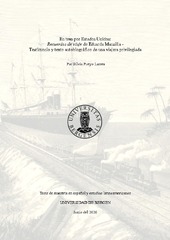| dc.contributor.author | Pueyo Larrea, Silvia Isabel | |
| dc.date.accessioned | 2020-08-25T05:28:07Z | |
| dc.date.available | 2020-08-25T05:28:07Z | |
| dc.date.issued | 2020-08-25 | |
| dc.date.submitted | 2020-08-24T22:00:17Z | |
| dc.identifier.uri | https://hdl.handle.net/1956/23883 | |
| dc.description.abstract | Sumario Esta tesis tiene por objeto aportar un nuevo análisis de Recuerdos de Viaje, el primer relato de viaje publicado en Argentina en 1882 y escrito con pinceladas autobiográficas por Eduarda Mansilla, una de las escritoras argentinas más influyentes del siglo XIX. Analizo la metáfora del tren, la voz de la viajera en diferentes espacios y su inversión del binomio civilizaciónbarbarie. Sus viajes en tren invitan al lector a conocer la Costa Este de Estados Unidos en ese primer año de guerra de secesión en 1861, en fase inicial de la modernización del país y del turismo. La elegante narración sin pseudónimo transmite al lector un nuevo enfoque literario con respecto a numerosos temas culturales. Con su mirada femenina desvela la realidad de la utopía estadounidense, fruto del Destino Manifiesto, ocultada por los escritores varoniles argentinos. El cuadro teórico se basa en definir el relato de viaje y presentar las características de la literatura de viaje y la autobiográfica según investigadores canónicos. El presente trabajo y su análisis se apoyan en nuevas publicaciones internacionales, además de archivos históricos parcialmente facilitados por Manuel Rafael García-Mansilla, el tataranieto de la autora. | en_US |
| dc.description.abstract | Abstract The aim of this thesis is to provide a new analysis of Recuerdos de Viaje (Memories of Travel), the first travel story published in Argentina in 1882 and written with autobiographical strokes by Eduarda Mansilla, one of the most influential Argentinian writers of the 19th century. I analyse the train metaphor, the voice of the traveller in different spaces and its inversion of the civilization-barbarism binomial. Her train trips invite the reader to visit the East Coast of the United States in that first year of war of secession in 1861, which is also the initial phase of modernization of the country and tourism. The elegant narrative without pseudonym conveys to the reader a new literary approach to many cultural issues. With her feminine gaze, she reveals the reality of American utopia, the fruit of Manifesto Fate, hidden by Argentinian male writers. The theoretical approach emphasizes on defining the travel narrative and presenting the characteristics of travel literature and autobiography according to canonical researchers. The present work and its analysis are based on new international publications and historical archives partially provided by Manuel Rafael García-Mansilla, authors great-great-grandson. | en_US |
| dc.language.iso | spa | |
| dc.publisher | The University of Bergen | |
| dc.rights | Copyright the Author. All rights reserved | |
| dc.subject | relato de viaje | |
| dc.subject | autobiografía; Modernidad; tren; Argentina; Estados Unidos | |
| dc.title | En tren por Estados Unidos: Recuerdos de viaje de Eduarda Mansilla - Testimonio y texto autobiográfico de una viajera privilegiada | |
| dc.type | Master thesis | |
| dc.date.updated | 2020-08-24T22:00:17Z | |
| dc.rights.holder | Copyright the Author. All rights reserved | |
| dc.description.degree | Mastergradsoppgave i spansk og latinamerikastudier | |
| dc.description.localcode | MAHF-SPLA | |
| dc.description.localcode | MAHF-LÆFR | |
| dc.description.localcode | SPLA350 | |
| dc.subject.nus | 711128 | |
| fs.subjectcode | SPLA350 | |
| fs.unitcode | 11-20-0 | |
